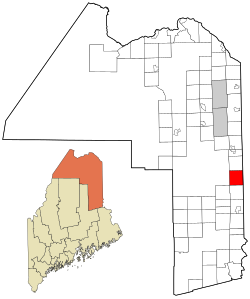2010 census
As of the census [7] of 2010, there were 790 people, 343 households, and 224 families living in the town. The population density was 20.7 inhabitants per square mile (8.0/km2). There were 422 housing units at an average density of 11.0 per square mile (4.2/km2). The racial makeup of the town was 92.9% White, 0.3% African American, 4.6% Native American, 0.3% Asian, and 2.0% from two or more races. Hispanic or Latino of any race were 0.3% of the population.
There were 343 households, of which 23.6% had children under the age of 18 living with them, 52.2% were married couples living together, 7.9% had a female householder with no husband present, 5.2% had a male householder with no wife present, and 34.7% were non-families. 29.4% of all households were made up of individuals, and 13.5% had someone living alone who was 65 years of age or older. The average household size was 2.30 and the average family size was 2.82.
The median age in the town was 47.1 years. 18% of residents were under the age of 18; 7.8% were between the ages of 18 and 24; 20.6% were from 25 to 44; 34.4% were from 45 to 64; and 19.2% were 65 years of age or older. The gender makeup of the town was 52.2% male and 47.8% female.
2000 census
As of the census [8] of 2000, there were 790 people, 325 households, and 230 families living in the town. The population density was 20.7 people per square mile (8.0/km2). There were 420 housing units at an average density of 11.0 per square mile (4.2/km2). The racial makeup of the town was 93.29% White, 4.43% Native American, 0.51% Asian, 0.89% from other races, and 0.89% from two or more races. Hispanic or Latino of any race were 0.13% of the population.
There were 325 households, out of which 28.6% had children under the age of 18 living with them, 59.7% were married couples living together, 6.2% had a female householder with no husband present, and 29.2% were non-families. 24.0% of all households were made up of individuals, and 14.8% had someone living alone who was 65 years of age or older. The average household size was 2.43 and the average family size was 2.90.
In the town, the age distribution of the population shows 22.5% under the age of 18, 7.1% from 18 to 24, 24.6% from 25 to 44, 26.6% from 45 to 64, and 19.2% who were 65 years of age or older. The median age was 42 years. For every 100 females, there were 92.2 males. For every 100 females age 18 and over, there were 96.2 males.
The median income for a household in the town was $23,566, and the median income for a family was $30,000. Males had a median income of $21,688 versus $17,431 for females. The per capita income for the town was $12,489. About 6.8% of families and 12.1% of the population were below the poverty line, including 6.8% of those under age 18 and 22.6% of those age 65 or over.

